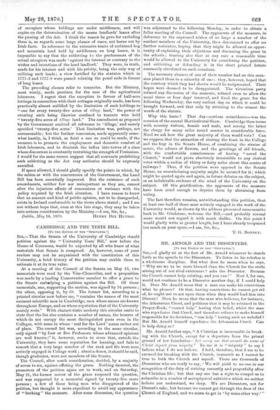CAMBRIDGE AND THE TESTS BILL.
[TO THE EDITOR OF THE "SPECTATOR."] SIR,— That the Senate of the University of Cambridge should petition against the " University Tests' Bill," now before the House of Commons, would be expected by all who know of what materials that Senate is composed. As, however, some of your readers may not be acquainted with the constitution of this University, a brief history of the petition may enable them to estimate it at its true value.
At a meeting of the Council of the Senate on May 16, two memorials were read by the Vice-Chancellor, and a proposition was made by a leading Conservative member to offer a grace to the Senate embodying a petition against the Bill. Of these memorials, one, supporting the motion, was signed by 94 persons ; the other, opposing it, by 69. The former list, according to a printed circular now before me, "contains the names of the most eminent scientific men in Cambridge, men whose names are known throughout Europe, and on whose reputation that of the University mainly rests." With characteristic modesty this circular omits to state that the list also contains a number of names, the bearers of which do not occupy the most distinguished posts even in the Colleges, with some in whom 'zeal for the Lord ' seems rather out of place. The second list was, according to the same circular, only signed "by four or five Professors whose advanced opinions are well known ;" it, however, omits to state that, outside the University, they have some reputation for learning, and fails to remark that a very large number of the rank and file were men actively engaged in College work ; about a dozen, it should be said, though graduates, were not members of the Senate.
The Council, after much consideration, decided, by a majority of seven to six, against offering the grace. Nothing daunted, the promoters of the petition again set to work, and on Saturday, May 21, the former mover of the grace reopened the question, and was supported by a memorial signed by twenty-five more persons ; a few of these being men who disapproved of the petition, but thought it more expedient to avoid any appearance of " burking " the measure. After some discussion, the question was adjourned to the following Monday, in order to obtain a fuller meeting of the Council. The opponents of the measure, in deference to the expressed wishes of so large a number of the resident members of the University, then determined to offer no further resistance, hoping that they might be allowed an oppor- tunity of explaining their objections and discussing the grace in the schools ; trusting also that at any rate a reasonable time would be allowed to the University for considering the petition, and criticizing or defending it in the short printed letters commonly circulated on such occasions.
The necessary absence of one of their number had on this occa- sion placed them in a minority of one; they, however, hoped that the courtesy which they had shown would be reciprocated. Their hopes were doomed to be disappointed. The victorious party refused any discussion of the measure, refused even to allow the usual three or four days' interval, and fixed the grace for tho following 'Wednesday, the very earliest day on which it could be brought forward, and that only by straining to the utmost the words of the statute.
Why this haste? That day—curious coincidence—was the occasion of the annual Horticultural Show. Cambridge then teems with country visitors, female and male, and among the latter the clergy for many miles round muster in considerable force. Need we ask how the great majority of them would vote? Can we suppose that the attraction of sharing the feast in the College and the fray in the Senate House, of combining the strains of music, the odours of flowers, and the greetings of old friends, with the comfortable consciousness of having "saved the Church," would not prove absolutely irresistible to any clerical voter within a radius of thirty or forty miles about this centre of railways ? Thus, if the petition were opposed in the Senate House, an overwhelming majority might be secured for it ; which might be quoted again and again, in future debates on the subject, as an indubitable evidence of the mind of the University on the subject. Of this gratification, the opponents of the measure have been cruel enough to deprive them by abstaining from voting.
The fact therefore remains, notwithstanding this petition, that at least one-half of those most actively engaged in the work of the University would, as shown by the address presented some months back to Mr. Gladstone, welcome the Bill,—and probably several more would not regard it with much dislike. On this point I would gladly write at greater length, but I have already trespassed too much on your space.—I am, Sir, &c.,
T. G. BONNEY.






























 Previous page
Previous page